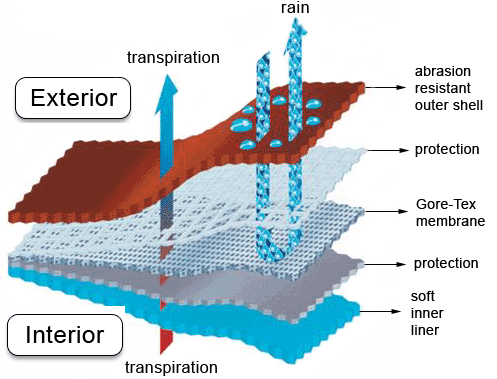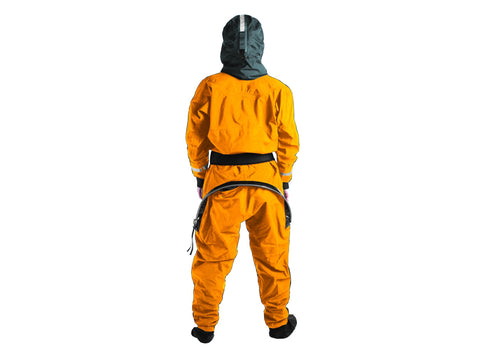Do I really need a dry suit?
The answer to that question will always be met with where and when are you paddling? Let me explain.
Dry Suits are a piece of gear that act to keep you dry when immersed. When participating in any type of aquatic activity, from kayaking to sailing, thermal protection (staying warm) is on the mind of most folks. Staying warm and dry while in and out of the water will help to keep the paddler comfortable allowing him or her to spend more time out enjoying the activity they love.
The need for a dry suit is a function of risk. Before you head out on the water for the day, or even for a couple of hours, it is a good idea to conduct a risk assessment. That assessment should cover a number of topics, ranging from weather to water temperature from proximity to the shore to whether you are paddling alone or with a group, depending on your activity and environment. At the conclusion of your risk assessment if it is deemed that the paddle plan for the day carries a lot of risk the need for a dry suit becomes much more important. The dry suit with proper insulating layers provides a high degree of thermal protection allowing the paddler more time in cold water environments allowing them to conduct self-rescues, to aid others who may be at risk and to allow for prolonged immersion lessening the risk of hypothermia.
So back to the question, "Do I really need a dry suit?" Will you be in a cold water environment? YES we recommend a dry suit. Will you be paddling a lot on your own? YES Will you be in open water? YES Do you have a hard time re-entering your boat or hopping back on your piece of equipment if you end up in the water? If the answer is yes than we recommend a drysuit. Again, the higher risk your on water outing is the more important the thermal protection of a dry suit provides becomes.
Suit Configurations and Features:
Dry suits and Surface Immersion Suits come in a variety of configurations. When selecting a suit the first thing will be to of course identify what you will be doing the most of while wearing the suit.
Dry Suit or Paddling Suit?
Flat-water paddling or Touring, Whitewater Kayaking/Canoeing, Sailing, Windsurfing or Spelunking. You can match your suits features to help best suit what you are doing. Those activities and the risks they carry will also effect your decision of whether or not you go with a Dry Suit, which will have latex gaskets in the wrists and neck keeping you 100% dry during complete immersion, or a Paddling Suit aka Surface immersion Suit which will have latex gaskets in the wrists and a neoprene gasket in the neck. The neoprene gasket is a bit more comfortable but will let some water in when the user is completely immersed. A paddling suit is a great option for paddlers who will be in calm environments who want a high degree of thermal protection.
If you are thinking about purchasing a dry suit or paddling suit here are some of the features you have available:
Body Tube (over Skirt): The body tube on a dry suit goes over the top of your spray skirt to keep water from entering your boat through the tunnel of the skirt. The Dry Suit is a terrific option for paddlers in dynamic environments (surf or whitewater), and for paddlers with a roll. On the other side of the coin if you are a small boat sailor or a paddler who spends most of your time in a flat-water setting, you obviously aren't going to need a body tube.
Front Entry, Rear Entry or Switch Zip:
A front entry suit will zip across the chest, typically diagonal from the shoulder to the opposite hip. This makes the suit easier to get on and off but the zipper can interfere with the body tube of your skirt allowing water to get into your boat.
A rear entry suit moves the zipper across the back of the garment, which prevents the zipper from interfering with the fit of your skirt tube but makes the suit a little more challenging to get on and off. Rear entry suits are common among whitewater and surf paddlers.
Switch Zip Suits from Kokatat have only been available for the past year. These suits have proven to be game changers for a lot of folks. The switch zip suits have taken the zipper and moved it to encircle the entire garment just above the waist. This removes the zipper from the spray skirt equation, but more importantly switch zip suits are modular, in that they are three pieces of gear in one. Mate the Top and Bottoms for a dry Suit or separate them for a Dry Top and Paddling Pants.

Sweet protection has built a suit that incorporate the best of both worlds. The Intergalactic is a front entry suit, but the zipper interfere with the skirt tube since Sweet has placed it much higher than typical configurations.
Materials:
The Material of the suit will effect the suits feel, performance (breathabilty) and durability. Suits materials can be broken into three categories:
Gore-Tex: Gore-Tex is a laminated material whcih uses the waterproof breathable Gore membrane. A laminated water proof breathable material, in a basic sense, is an outer fabric, a waterproof breathable membrane an interior fabric. This constructions adds a high degree of durability since the waterproof breathable membrane is sandwiched between outer an inner layers of fabric. Gore-Tex has the highest degree of breath-ability of all the laminated materials used in dry suit construction. This high degree of breath-ability will serve to keep the paddler more comfortable by decreasing the amount of moisture that is trapped on the interior of the suit.

Other Laminates: Many dry suit manufacturers have created their own waterproof breathable laminate materials that offer a high degree of durability but are a bit less breathable than Gore-Tex. Why doesn't every manufacturer build with Gore-Tex if it is the best material? Gore approves each manufacturer to ensure that the construction process is up to the high standards of the material.
These "other" laminates are terrific alternatives to gore-tex especially when worn for day paddles and especially for those paddlers who are on a budget who still want a high quality piece of gear. They often carry comprehensive warranties, depending on manufacturer, and still offer a high degree of durability.
Coated Materials: Are quite different than the laminates. Instead of layers of fabric there is a waterproof coating that is applied to the backside of the exterior shell. This waterproof coating serves to keep the user dry but does not breath very well. The coating, left exposed on the interior of the suit will eventually wear due to abrasion. As the material wears it becomes less waterproof. This material is a great option for paddlers who will use the suit once in a while. Not ideal for folks who will the suit on a regular basis. In short the more you wear any coated material the quicker the coating will wear.
*The suit material will also have an impact on the suits warranty.
Sizing:
It is of course important to ensure that your suit fits properly in order to be comfortable and functional particularly if you go for a swim. Here at KPS we are of the opinion that your suit should be fit to produce as little extra fabric as possilbe. Often times this fit is referred to as "competition cut". The reasoning is pretty simple, if you end up in the water and have to swim for your boat, the river bank or a myriad of other scenarios the baggier your suit is the tougher the swim becomes. All that extra material acts as an underwater sail making a swim particularly tough in the moving water found in rivers or the surf. Some suits are cut twith a little more "style" with baggier legs and torso. We get it style does count, but keep in mind you have to be able to swim in your suit.
So how do you ensure that your suit will fit properly? Each suit manufacturer has their own size chart and their own definitions for measurements. For example: one manufacturer may define the inseam measurement as the distance from the highest part on the inside of your leg down to the ankle bone. While another defines inseam as the measurement from the highest part of the inside of your leg to the floor. Not only is it important to measure accurately but is also important to recognize what the specific manufacturer is looking for.
When it is time to measure yourself for your suit have a friend give you a hand because some of the measurements can be a bit tricky on your own. Once you and your friend have all of the data and its time to pick the size it is important to realize that it is rare that an individual will fall into the size ranges listed in all of the categories since we are built so differently. Always go up a size if you are between sizes! Not comfortable with that concept? That's OK, we have the ability to customize the fit of your suit for you. That's right! Working with Kokatat, one of the industries leaders, we are able to get a suit that is custom fit for you. Kokatat has also built a handy tool to help customers hone in on proper fit. Its called the Gizmo, check it out!
Women's Suits:
Women's suits are of course cut differently than Men's. The other main difference between a Men's and Women's suit is the position of the relief zipper. A Men's suit will with have the relief zipper placed in the front of the suit or the suit can be a switch zip , in which case the paddler can use the switch zip entry for relief. Women's suits will either have a drop seat, a zipper that is positioned in an arc framing the paddlers backside, a lowered front relief zipper (similar to those on Men's suits but positioned lower for better functionality) or a switch zip suit. A drop seat, for some ladies, can get in the way when seated in the boat. We recommend paddling with a couple of options before you buy your suit.
Drop Seat Example:

Warranties:
We definitely understand that dry suits are an investment and if anything should happen with the suit in regard to construction it is important to know where you stand. Here is some basic info. about the dry suit manfucturers we choose to work with:
Kokatat: Kokatat warranties all Gore-Tex and Hydrus dry suits for the life of the garment. Hydrus is Kokatat's proprietary laminate.
"All Kokatat products are fully guaranteed to the original owner against defects in materials and workmanship. Products found to be defective will be repaired or replaced at Kokatat’s option. Repairs due to normal wear and tear, accident, abuse, etc., will be made for a reasonable charge. Latex gaskets are not covered by the Kokatat warranty. There is a 2 year limited warranty on all TROPOS (coated material) suits. The manufacturer specifically disavows any other representative warranty or liability relative to the condition or use of the product." -Kokatat
Sweet Protection: "Our simple mission is to build the best possible products. We always seek to use the most advanced materials, technology and production methods. Sweet Protection AS warrants all products to be free of defects in material or workmanship for a period of two (2) years from the date of purchase.
If a Sweet product fails due to defects in craftsmanship or materials, within the warranty period, we will repair or replace the product free of charge. Be aware that this warranty is limited to the original purchaser only." -Sweet Protection
Immersion Research: "By spending your money on an piece of IR gear, you’ve trusted us to keep you warm, safe and comfortable on the river. In exchange for that trust, here’s what we promise to you:
- We stand behind our products 100%. We can’t promise that your kayaking gear will last forever, but we can promise to take care of any defects in materials, workmanship or design for the life of the garment.
- We want to offer the best customer service on earth. When you call us, a real-live expert kayaker will pick up the phone ready to help and answer any questions you have. Same for emails. We’re paddlers, and we’re in this business because we like to help other paddlers.
- We service your gear as quickly as humanly possible. Kayaking is tough on gear, that’s why we have a full time in-house staff and a complete machine set dedicated to expert repairs on any piece of IR gear.
- We always look out for your best interest. We’re believers in karma. When we go the extra yard to make sure you’re 100% happy with your IR purchase, we know that we are doing the right thing. That’s all that matters." - Immersion Research
It is best to work with a trained professional, someone who has a lot of experience fitting suits for folks. Here at Olympic Outdoor Center we have been working closely with our customers to ensure they select the proper piece of equipment since 1986. Let us use our experience and expertise to help you properly select and fit your next dry suit. Give us a call (360) 297-4659 send us an email or use the instant chat we are always happy to help!



